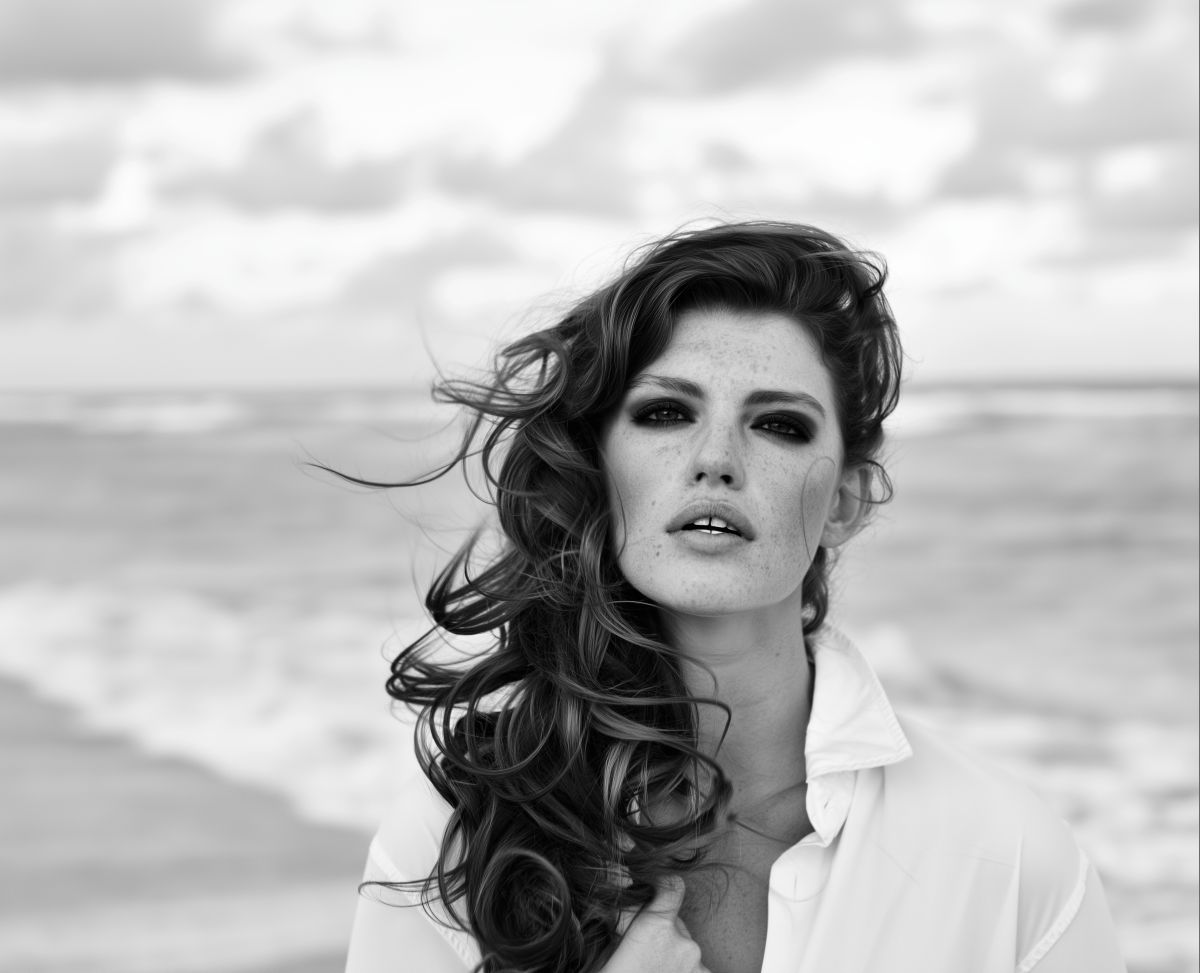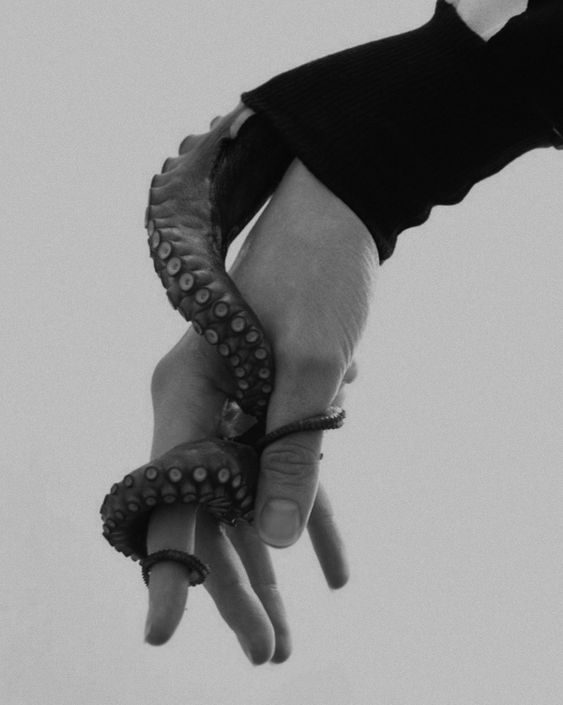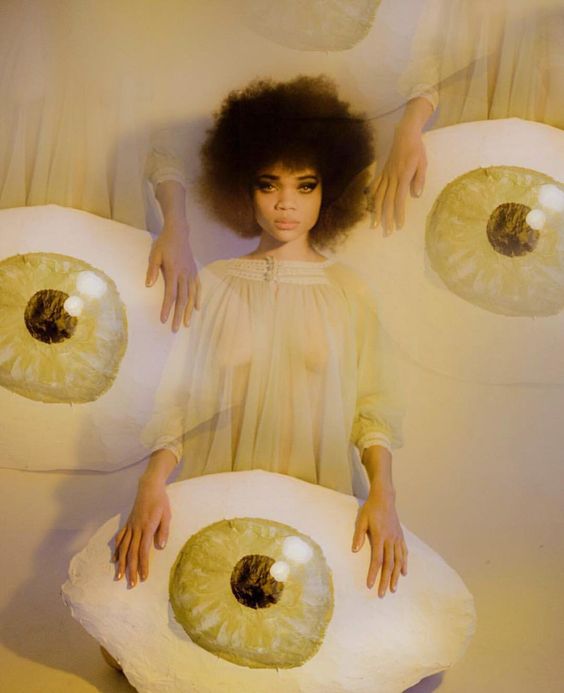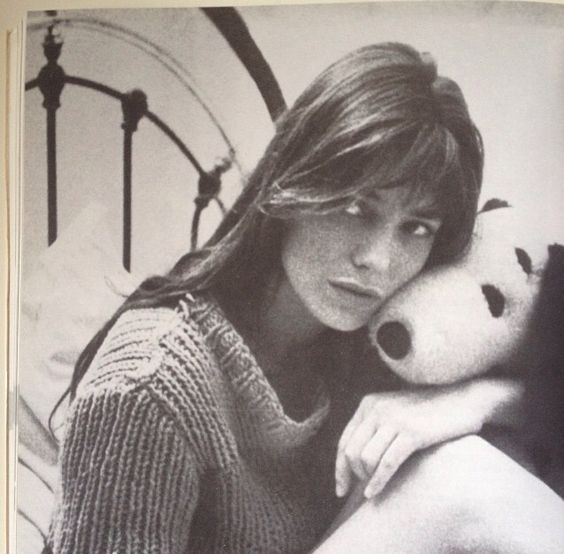 In astrology, Neptune is often associated with illusion, fantasy, and the otherworldly, casting a spell over the mundane to reveal beauty and transcendence where it might otherwise seem absent. This can serve as a coping mechanism for dealing with harsher realities, offering escape to those with a Neptunian disposition. Neptunian individuals might be drawn to beautiful, surreal, or glamourous imagery in art, photography, and film that transcends ordinary perception, highlighting the mystical or otherworldly aspects of the subject matter. Surreal and glamourous imagery often relies on symbolism and metaphor, which are languages Neptunians speak fluently. They are enchanted by the hidden meanings and the layers of interpretation that such art offers. A seemingly simple image can hold a universe of significance for a Neptunian viewer.
In astrology, Neptune is often associated with illusion, fantasy, and the otherworldly, casting a spell over the mundane to reveal beauty and transcendence where it might otherwise seem absent. This can serve as a coping mechanism for dealing with harsher realities, offering escape to those with a Neptunian disposition. Neptunian individuals might be drawn to beautiful, surreal, or glamourous imagery in art, photography, and film that transcends ordinary perception, highlighting the mystical or otherworldly aspects of the subject matter. Surreal and glamourous imagery often relies on symbolism and metaphor, which are languages Neptunians speak fluently. They are enchanted by the hidden meanings and the layers of interpretation that such art offers. A seemingly simple image can hold a universe of significance for a Neptunian viewer.
Many Neptunians are not just consumers of this imagery but creators as well. They use their artistic talents to craft visuals that transport viewers to other realms. Their work often reflects their inner visions and dreams, bringing a piece of the otherworldly into the here and now. Channeling their dreams and fantasies into creative outlets allows Neptunians to express their inner worlds constructively. This can be through painting, writing, filmmaking, or any other medium that resonates with them.
Platforms that allow for curated personas and idealized snapshots of life can be a form of glamour, showcasing a life more extraordinary than the everyday. For Neptunian personalities, being drawn to the world of glamour can be a survival mechanism, not just a superficial indulgence. While there’s truth to the idea that living in an illusion can be unhealthy, for those influenced heavily by Neptune, these veils of beauty can serve as vital buffers against life’s more challenging aspects. Removing someone’s illusions or “bursting their bubble” isn’t always a kindness. For some, these glamorous veils are protective barriers that guard against deeper, more debilitating states of despair or depression.
Neptunians are often souls ensnared by Neptune’s glamour, there’s something in the shimmering veils that drape over life’s harsh edges. They are the dreamers, the poets, the artists who see the world through a lens tinted with a touch of magic, preferring the haze of fantasy over the often dreary landscape of reality.
For some, glamour lies in beautiful photographs and art that transform life into something more beautiful. Others might be enchanted by the world of celebrities. The glitz, the glamour, the stories spun by the media – it’s a world far removed from their own, a modern-day Olympus where gods and goddesses walk among us, dazzling mere mortals with their star power. There’s also a subset drawn to the spiritual and mystical. Whether it’s the promise of transcendence found in a spiritual group or the mystique of ancient wisdom, these Neptunians find a shimmering promise of something greater, something beyond the veil of the ordinary. The fashion world, with its ever-changing trends can be a Neptunian world. Here, clothes are are transformative, a way to become someone else, even if just for a moment. The silver screen and stage hold a special kind of magic. Films and plays are portals to different worlds, places where reality is suspended, and anything is possible. Within the pages of a book lies an escape hatch to another realm. The intoxicating rhythm of music and dance can lift spirits like nothing else. It’s a direct line to the soul, bypassing the rational mind and speaking in a language of pure emotion. While some of this may not fall into the aspects of glamour and can feel more like escapism, it aligns with Neptune.
Neptunians might be fully aware of the illusory nature of these glamours, yet there’s a deep-seated recognition that sometimes, these shimmering illusions are necessary. They can be a balm, a gentle reminder that beauty still exists, even if it is just a veneer over reality’s cracks. To rob someone of their illusions might be akin to stealing the stars from their night sky – it’s often the shimmer that makes the darkness bearable. In essence, the glamours that call to Neptunians are as varied and multifaceted as Neptune itself. They offer a refuge, a soft place to land in a world that can often be unkind. So, let them revel in their beautiful bubbles, for it’s within these bubbles that they find their strength, their inspiration, and their peace.
Glamour can act an addictive escape and reveals much about human psychology and our relationship with beauty and fantasy. Glamour, in many ways, serves as both a refuge and a potent psychological stimulant. It provides a temporary escape from everyday life, offering a glimpse into a more enchanting world where the usual rules and limitations do not apply. This can be particularly appealing during times of stress or monotony. By engaging with glamorous images or worlds, individuals can alter their emotional state, feeling uplifted or momentarily transported away from their troubles.
Glamour often presents an idealized version of life, beauty, success, and other desirables. For many, these portrayals ignite aspirations and desires, pushing them toward what they perceive as higher or more exciting states of being. Glamorous images often symbolize personal hopes and dreams, serving as reminders or icons of what one might strive for or desire to experience. Even as glamour offers an escape, it also provides a sense of familiarity and comfort—styles, stories, or images that resonate on a personal level can feel like returning to a well-loved fantasy or dream. Constant exposure to glamorous lifestyles and idealized images in media reinforces their appeal, making it seem normal or desirable to aspire toward glamour.
Enjoying the beauty and escapism it offers without becoming overly reliant on it for emotional comfort or identity is essential. Acknowledging the artifice without letting it diminish the enjoyment can lead to a healthier, more sustainable relationship with glamour. For those who might be more vulnerable to its addictive qualities, finding multiple sources of joy and fulfillment can help mitigate the risk of overdependence.
The planet Neptune is a siren’s call, beckoning us into a world where everything glitters and the real word is but a distant memory. Why does it hold such power over us? Glamour, in its many forms, offers a tantalizing escape from the relentless march of reality. It’s a visual delight and a full sensory experience that can transport us to realms where everything glistens with possibility. Glamour serves as a portal to a fantastical world, a refuge from the humdrum and often harsh truths of daily life. It allows us to forget ourselves, to step into a space where the rules of reality are suspended. This temporary escape can be incredibly soothing, like respite for a weary soul. The aesthetics of glamour – be it in art, fashion, or film – can stir emotions, lift spirits, and evoke a sense of wonder. You’re being wrapped in a warm, glittering blanket that makes everything seem brighter, more hopeful. here’s a certain magic in knowing that what you’re seeing isn’t entirely real. It’s the enchantment of illusion, the joy of being deceived willingly, of indulging in a beautiful lie that paints over life’s imperfections. Glamour can inspire creativity and drive. It can spark ideas, motivate you to pursue your passions, and elevate your sense of what’s possible. Artists, writers, and dreamers often draw from these wells of beauty to create something new and profound.
Glamour allows us to flirt with different identities, to imagine ourselves as someone else, even if just for a moment. It offers a taste of what could be, feeding our aspirations and dreams, even if we know they’re just that – dreams. While some can indulge in glamour with a light heart, knowing it’s all a facade, others might find themselves increasingly drawn into its spell. For many, a touch of glamour is enough. They can appreciate the beauty and wonder without losing themselves in it. They know it’s a temporary escape, a momentary indulgence that adds a sparkle to their day. There’s no need to feel guilt for enjoying a bit of glamour, for allowing yourself to be enchanted and uplifted by it. On the other hand, there’s the risk of becoming overly reliant on these fantasies.
When reality feels too harsh, the temptation to retreat entirely into the glamorous world can be strong. This overindulgence can lead to a kind of addiction, where the line between illusion and reality becomes increasingly blurred. You have to know the difference between illusion and reality. The world of glamour is often built on illusions—photoshopped images, scripted realities, and curated perfection. Enjoy the magic but remember it’s a constructed magic. You have to also find beauty in your own reality. Celebrate your achievements, however small they might seem compared to the glittering images you see. Your life, in all its imperfections, has its own magic and worth.
While glamour can be a temporary escape, seek deeper and more authentic sources of fulfillment in your life. Build relationships, pursue passions, and engage in activities that provide lasting joy and satisfaction. Allow yourself to be seduced by glamour now and then. Let it lift you up, inspire you, and refresh you. But always come back to earth, grounded and aware, carrying the dream within you but not letting it define you.
Some people have expressed that they hate being drawn into glamour because it makes them feel bad about themselves, their bodies, their real lives, their relationships, and even where they live. Glamour often sets up unrealistic standards. Whether it’s airbrushed images, curated lifestyles, or idealized relationships, these representations can make real life feel lacking in comparison. Feeling inadequate compared to the glamorous images can take an emotional toll. It can affect self-esteem, body image, and overall happiness. However, instead of seeing glamour as a standard to live up to, view it as a form of art or fantasy. Appreciate it for its creativity and beauty without feeling the need to emulate it.
Maybe a beautiful photograph inspires you to explore your own creativity, or a glamorous outfit gives you ideas for your personal style. Use it as a spark, not a benchmark. The world of glamour, with all its sparkle and allure, doesn’t have to be a source of pain. Remember, you are more than enough as you are. Your worth isn’t measured by how well you match up to a glamorous image but by your unique qualities, your kindness, your creativity, and your love.
As a Neptunian myself, I sometimes get odd comments about the images I use on my website, saying they’re all women and unrealistic. Sometimes, a touch of glamour can brighten a dull day. I have never compared myself to the women in the images; I saw it more as the photographer’s art and symbolism. It can be as simple as a woman emerging from the sea in a mermaid-like dress, and I think, “That’s giving me Neptune vibes.” I never feel resentment looking at these images. Some people are uplifted by the Neptune glamour, feeling the same surge of inspiration. Others may feel discomfort or unease. Art, in all its forms, serves as a mirror to our inner selves. Yes, we live in a world that often demands practicality, but there’s also room for the magical, the breathtaking, and the beautifully surreal. Glamour serves as a shimmering refuge, a burst of color in an otherwise monochrome existence. It’s not superficiality; it’s a celebration of beauty, of art, of the extraordinary. And who is to dictate the parameters of one’s aesthetic home? Those who label glamour as superficial often miss the deeper currents beneath its glossy surface. Glamour, like the sea, has depth. It’s not just about the outward shine but about the feelings it evokes—the joy, the inspiration, the escape from reality. It’s about allowing oneself to indulge in a bit of fantasy, to momentarily transcend the ordinary.
Sometimes, the glamour we hate is a reflection of something within ourselves that we struggle to accept. It’s like looking into a distorted mirror, seeing aspects of our desires and insecurities magnified and glamorized. This can create a mix of attraction and aversion, a push-pull dynamic that’s hard to escape. Glamour often embodies ideals that we feel are out of reach. This can stir up feelings of resentment and envy. We might despise the perfection it represents because it highlights our own perceived imperfections. Yet, we can’t help but be drawn to it, wishing we could attain even a fragment of it. Even if we reject these ideals intellectually, emotionally, we might still be influenced. The constant bombardment of these images can create an internal conflict, where our conscious mind resists, but our subconscious is seduced.
Neptune doesn’t deal in realities; it prefers the soft focus of dreams and illusions. It’s like being seduced by a mirage, knowing it’s not real, but yearning for the comfort it promises. Human desires are not straightforward. We can long for what we reject and be repelled by what we secretly yearn for. This complexity is part of what makes us human, filled with contradictions and multifaceted emotions.
In Liz Greene’s book ‘Neptune and the Quest for Redemption,’ she mentions Alice Bailey, a channeler of information, and discusses the various lessons related to Neptune. In her esoteric writings, she described glamour as a kind of astral fog, a deceptive veil that distorts reality and entraps the soul in illusions. She viewed glamour as a force that must be understood and transcended on the spiritual path. Bailey spoke of glamour as a veil that clouds true vision. Neptune, too, is associated with this veil of illusion. Under Neptune’s influence, reality can appear softer, more beautiful, but also more deceptive. Recognizing this, we can start to see how glamour, in a Neptunian sense, serves as both a seductive escape and a spiritual test.
Bailey emphasized that the path to spiritual growth involves piercing through these glamours to see the truth. Neptune’s energy can inspire high spiritual aspirations, but it can also lead to disillusionment if we cling too tightly to the illusions. The key is to use Neptune’s influence to aspire towards higher ideals without losing sight of the grounding reality. Glamour, according to Bailey, often operates on the astral plane, affecting our emotions and desires. Neptune’s energy similarly operates on these subtle planes, influencing our dreams and unconscious mind. By being aware of how these energies play out, we can start to discern the difference between genuine inspiration and mere fantasy.
Here is what Liz Greene says about GLAMOUR:
“We are all individuals!” Fashion may also be an object of contempt amongst those who consider themselves intellectually, spiritually, or morally above such meaningless, banal, or selfish trends. Yet being ideologically opposed to fashion is also, in certain circles, fashionable according to the tenets of the ideology, and makes the same kind of statement of collective membership as the Armani suit or the Gucci scarf do in London’s Sloane Square. Rejecting fashionable makeup and clothing on such grounds produces a curiously uniform brigade of fashionable unfashionables who tend to look as much like each other as do the overdressed mannequins on a catwalk. Ultimately we are all infected by fashion in one way or another, whether we reject it or embrace it. Astrology, itself, has gone in and out of fashion at various epochs of history, and there are fashions within astrology, too, that dictate whether the student will rush out to buy a copy of William Lilly, plunge into Jungian analysis, or struggle to learn ancient Greek. Fashion, like water, slides away when one tries to define wherein its mysterious power lies. Who starts a trend? Who decides whether a certain hemline, colour, makeup technique, hairstyle, song, film, or novel will sell to millions? And if such a magician can be found, wherein does his or her power lie? …When we try to be fashionable, we hope to become glamorous. Glamour belongs to Neptune, and is as difficult to define. Glamour enchants us; the word itself is a corruption of the Middle English gramarye or magic, which holds us in its spell. The glamour of the actor, the pop star, the charismatic politician or the football hero is subtle, invisible, and not reproducible through any artificial means. One cannot consciously create glamour; the audience may be polite but doesn’t buy tickets next time. Like fashion, glamour, too, depends upon the zeitgeist of the epoch. Copying a star’s hairstyle, clothing, makeup, or manner will not give us glamour, although the enormous profits generated by the clothing and cosmetic industries are testimony to the fact that, even though we know this, we continue to put our faith in the impossible. Glamour is also ambivalent. An important dimension of its power is that, like Neptune, it contains apparently irreconcilable opposites. Goodness and badness, innocence and corruption, spirituality and carnality fluidly change places within one nature. Really nice people are not usually glamorous. Once again, Shakespeare’s Cleopatra offers us insight into this paradox: Neptunians are often extremely glamorous to those of their own epoch. This tells us nothing about their real identity, their values, the degree of personal integrity they possess, or their motives, opinions, and beliefs. They are gifted at tuning in to what the world needs them to be. These collective needs change according to the era, but there will always be people who have the capacity to personify them. Someone with a powerful Neptune in their natal chart has the the power to arouse others’ dreams. We, the dreamers, deeply touched because our own Neptunes are vibrating in sympathy, do not care to know what is behind the glamorous image of our idols.
Neptune’s influence is not just about the obvious glamour found in fashion and celebrity culture; it’s also about the deeper, often unconscious longings that reside within us. Neptune taps into our dreams, our nostalgia, our yearnings for something beyond the mundane. It’s a siren’s call, a whisper of what could be, an invitation to a world where everything shimmers with possibility. We all have moments of naivety, especially when it comes to the areas governed by Neptune in our astrological charts. Whether it’s love, creativity, spirituality, or any other domain, Neptune can make us see things through rose-colored glasses. This naivety can lead to disappointment when the veil is lifted and reality comes into focus. When it comes to Neptune, we have all suffered the simultaneous attraction and repulsion, the worship of the dream and the hatred of the deception.
Neptune works on an emotional level, often bypassing our rational defenses. It can seduce us with visions of perfect love, artistic success, spiritual enlightenment, or other ideals that resonate deeply with our hearts. Neptune often taps into our nostalgic longing for something lost or unattainable. This can be incredibly seductive, making us yearn for a past that never was or a future that’s just out of reach. When the glamour fades, the disillusionment can be sharp. We might feel foolish for having believed in the illusion, angry at ourselves for our naivety. This is a common Neptunian experience – the painful but necessary awakening from a beautiful dream.
It’s important to allow yourself to dream and be inspired by Neptune’s glamour, but always with a touch of grounding. Recognize the difference between inspiration and illusion. Learn to see through the glamour. It doesn’t mean rejecting all that is beautiful or inspiring, but understanding the underlying truth. This discernment can save you from future disappointments. Accepting your own susceptibility to Neptune’s seduction is a powerful step. It’s okay to be drawn in; it’s a part of being human. Find a balance between the Neptunian dream and the practical realities of life. Let your dreams inspire you, but let your actions be guided by a clear-eyed understanding of what is achievable.
Glamour, when understood in this broader sense, becomes a catalyst for personal growth. It’s not just a superficial distraction. The journey with Neptune is about integrating the otherworldly with the real. It’s about allowing ourselves to be enchanted, but not ensnared; to worship the beauty of the dream, but not to hate ourselves for being drawn to it.











